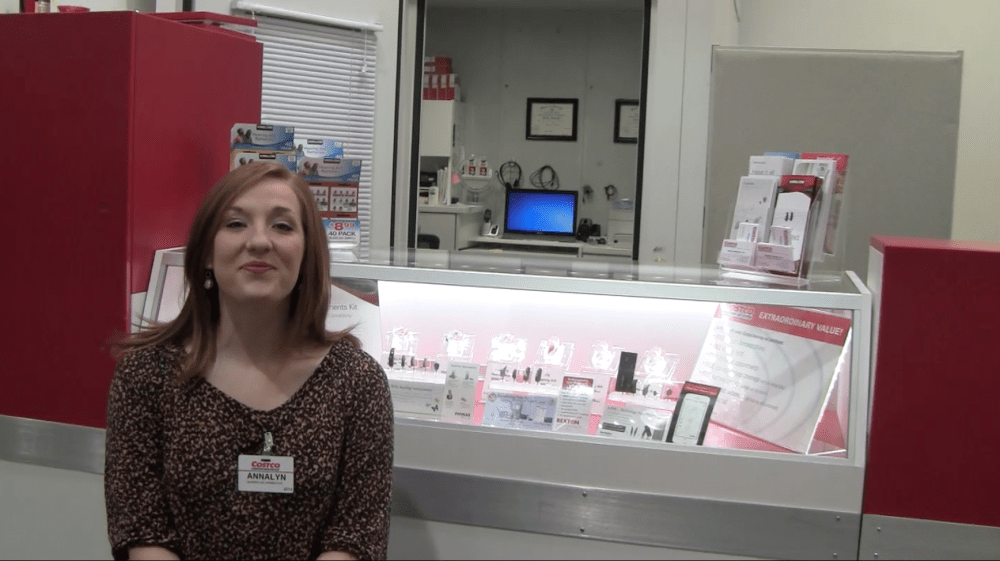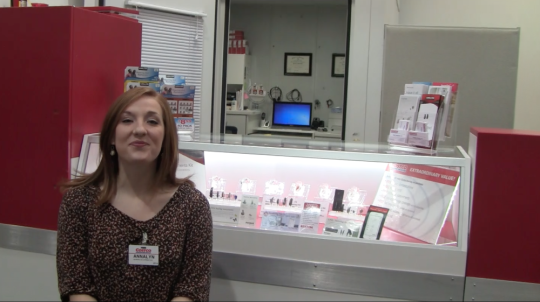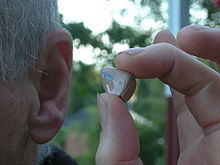“Have you ever seen your eardrum before? Well, today’s the day! We’re gonna see what the Good Lord created in there!”
Annalyn Tocci is joking with a man as she inspects his ear, using a device hooked up to a display screen.
Tocci is in the hearing aid field. It’s an interesting line of work, but the path she took to get into it may be even more interesting.
She always wanted to be a doctor. She grew up excited about science and math and admired the role that doctors play in the lives of people and communities.
And then, when she was 13, her life changed in an instant. She and her family were in a terrible car crash.
The accident left her mostly paralyzed from the waist down. She also suffered a concussion as well as a laceration that ran from her scalp to below her eye. She suffered internal bleeding that required abdominal surgery to repair.
Once she was moved to Shepherd Center in Atlanta, she needed to have a lumbar fusion to stabilize her back. Since then, she has depended on a wheelchair to get around.
Instead of shattering her dream, the wreck solidified Tocci’s conviction that medicine was the career for her.
The more time she spent in hospitals and rehabilitation centers, the more certain she was. “I wanted to be a part of healing and helping people improve their standard of life,” Tocci said. She remembers telling herself, “I’m gonna strive towards this,’ and she says, “I went kind of all out for it.”
She was a pre-med student at the University of Georgia when she met a graduate student named Jim, who had moved to Athens from Pennsylvania. They sweated out the med school application process together, she enrolled at the Medical College of Georgia in Augusta, and the two married during her second year.
“I had no idea that I would marry him until my first year of medical school. We got engaged the summer right after my first year of med school. He surprised me while I was serving as a camp counselor at Camp Rainbow, a camp for children with cancer,” Tocci said.
But Tocci withdrew from medical school later that same year.
The decision was not made in haste. And Tocci has never looked back.
An agonizing choice
According to the Association of American Medical Colleges, most people who drop out of medical school do so within the first two years.
Dr. Barbara Schuster, former dean of the UGA-GRU Medical Partnership, said that from her experience, there are many possible reasons why a medical student may choose to withdraw.
“Most commonly, withdrawals occur during the first or second year, though occasionally withdrawal does occur in the third or fourth year, when a student is immersed in the clinical environment and must confront the most significant issues of actually caring for patients,” Schuster said.
“Overall,” Schuster continued, “few people withdraw. As a whole, medical students are very healthy with great physical, mental and emotional capacity who have been committed to a medical career. But they are human, so a few folks do have problems or change their minds. The specifics of withdrawal are quite personal.”
What Tocci could not have predicted when she withdrew from the Medical College of Georgia on April 6, 2014 – she remembers the date exactly – was that she’d find her place at Costco, helping customers hear better.
[youtube]https://www.youtube.com/watch?v=Ze4AIfZDc1s[/youtube]Giving up on becoming a physician was wrenching for her, and she had long talks with her husband and her mother before leaving medical school. She had started school in 2011 and took some time off after completing after completing her first two years. She wanted to reflect on the situation and be sure her decision was the right one before she officially withdrew.
“It took me several months to decide, because I wanted to do the right thing and not make a rash decision that would affect me for the rest of my life,” she said.
“The whole time going through medical school I was thinking, ‘How am I going to make this work? How am I going to have the stamina to go through residency and have kids because, according to my biological clock, I should be having kids while I’m in residency? How am I going to do all of that and be a good wife and a good mother and a good doctor all at the same time? I don’t know that I have the stamina to do it all and do it well,’” Tocci said.
She had always expected the med school workload to be strenuous, but it quickly became overwhelming. The first two years are heavy on basic sciences, such as biochemistry and anatomy, and students must pass tests on every chunk of material. Tocci fell short by less than one point on one of these tests, which put her behind her classmates.
Shortly after her wedding, she plunged into preparing for the first part of the national board examination that all second-year students must pass before entering clinical training in their third year. Students who are progressing on schedule tend to band together in study groups to help one another master vast amounts of material needed to pass the test.
Tocci, because she was slightly behind, faced the board exams on her own, without the comfort of a study group.
Jim Tocci remembers this period well. “I think, for her, it came down to a decision of ‘Do I want to take care of myself and family for the rest of my life or do I want to pour myself out for my patients?’ I feel like, in her mind, she couldn’t do both of them,” he said.
Annalyn Tocci developed depression, sought help, and began taking medication. Looking back, she sees that the academic stress “started turning me into a person I didn’t want to be, as in becoming very cynical, becoming very negative, not enjoying my life,” she said. She wasn’t willing to live like that.
But relinquishing a lifelong dream is not easy, even if pursuing the dream is beginning to make you miserable.
“In our society, if you give up on something or you quit or withdraw, it’s looked down upon,” Tocci said. For a long time, she felt like a failure.
A new path
One day, when she was shopping at a Costco in Augusta, a manager approached her and asked if she wanted a job. She thought about it, said yes, and worked for a few months dealing with customers at the front door. When an opening at the store’s hearing aid center became available, a co-worker encouraged her to apply.
Though hesitant at first, Tocci decided to go for it. She got the job. She’s now a hearing aid apprentice and is studying to become a hearing instrument specialist – there are several big licensing exams she will face along the way – and she is no longer taking antidepressants. She has no plans to return to medical school.
Although she never could have predicted this, Tocci has found a job that gives her the direct patient contact that she always sought.
“I wanted to be a doctor that really spent time with their patients and wasn’t always having to be so rushed,” she said. “In med school, I was beginning to see [that] my lifestyle wasn’t going to look like that, with how medicine is going right now.” In most medical practices, seeing more patients in less time has become the norm.
The hearing aid center operates at a slower pace than a typical medical office, and it’s the kind of pace that suits Tocci. It lets her enjoy what she’s doing.
Not long ago, a young man in his 30s, dragged in by his father, reluctantly agreed to a hearing test. He had significant hearing loss in one ear, and Tocci and her co-workers persuaded him to try on hearing aids. She inserted them and continued talking about how the devices worked.
Suddenly, the young man’s face flushed, his eyes scrunched up, and he burst into tears. For the first time in 15 years, he was hearing in both ears.
“Just to be able to help somebody that much, knowing that their life is going to be changed, it’s a positive, rewarding feeling,” she says. “It’s cool to be able to help folks here every day.”
Lauren Schumacker is pursuing her master’s in health and medical journalism at the University of Georgia. She also holds a certificate in culinary arts and enjoys writing about all things food-related.



